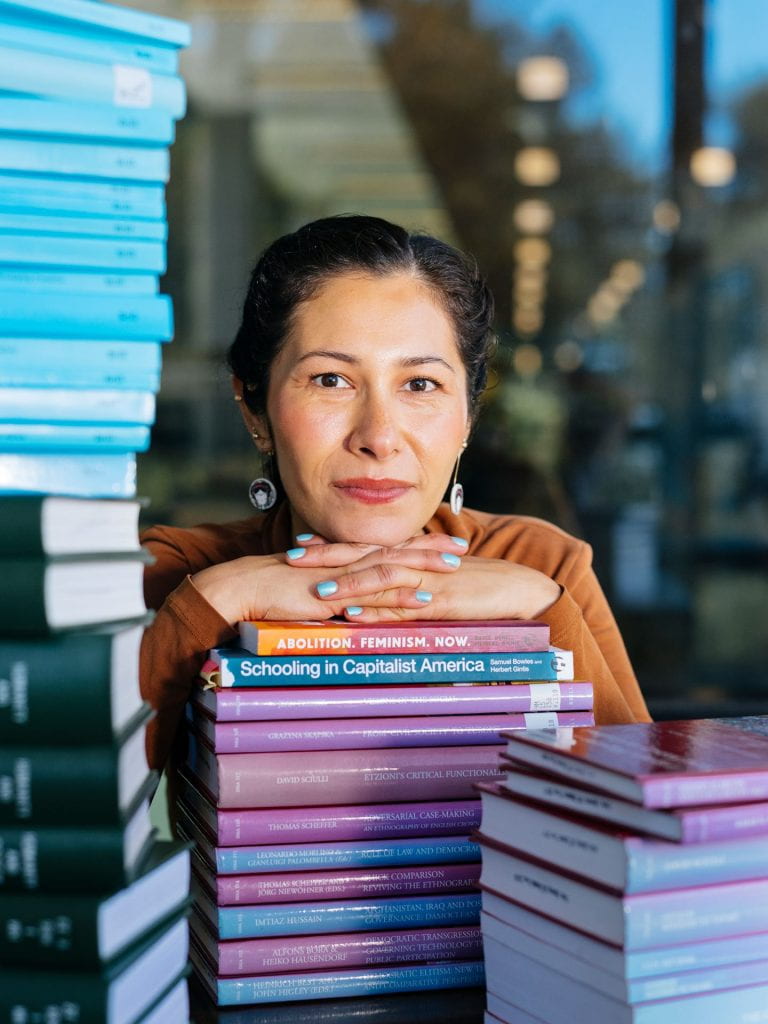
Envisioning Graduate Education for the Future
Committee members
Peter Biehl, Vice Provost and Dean of Graduate Studies and Professor of Anthropology, co-chair
Matthew Guthaus, Professor of Computer Science and Associate Dean of Graduate Studies, Baskin School of Engineering, co-chair
Stephanie Casher, Assistant Dean of Graduate Studies
Michael Chemers, Associate Professor, Dramatic Literature
Hao Deng, Undergraduate student representative
Betty Desta, Slug Support Manager
Kendra Dority, Director for Graduate Student and Postdoc Professional Development, The Teaching and Learning Center
Becky George, Assistant Vice Provost of Global Engagement and Senior International Officer
Qi Gong, Professor, Applied Mathematics
Stephanie Herrera, Ph.D. Candidate in Electrical Engineering, Treasurer of the Graduate Student Association.
Grace Kistler-Fair, Molecular, Cell, & Developmental Biology Depar tment Assistant Depar tment Manager
Steve McKay, Associate Professor, Sociology
Audrey Morrow, Ph.D. Candidate in Psychology, Treasurer of Graduate Student Commons
Natasha Pedroza, Chief Development Officer, UC Observatories
Juan Poblete, Professor, Literature
Enrico Ramirez-Ruiz, Professor, Astronomy and Astrophysics
Sara Sanchez, GANAS Graduate Program Director, HSI Initiatives
Magy Seif el-Nasr, Professor, Computational Media
Grace Yun, Ph.D. Candidate in
Staff support
Rachel Neuman, Director of Graduate Student Life
Committee Charge
We value graduate education as an integral component of our mission and seek to provide our graduate students with instruction, research, and professional development opportunities to help them prepare for rewarding lives and making important contributions to society. The committee was tasked with creating opportunities for faculty, staff, and students to discuss how the campus should approach graduate education over the next decade.
The committee considered the following as part of its recommendations:
- Recruit excellent and diverse graduate students and provide them with transformative education based on academic program outcomes that prepare them for future success.
- Improve student success and inclusive excellence (retention, time-to-degree, placement) through a more planned and purposeful 5/2-year funding commitment.
- Provide programs and opportunities for professional development so that graduate students can achieve their career aspirations.
- Support, develop, and enhance opportunities for graduate research, scholarship, and creative expression.
- Build and support a welcoming, respectful, strong, diverse, and resilient graduate community.
- Foster innovation in graduate education, especially in supporting existing and creating new interdisciplinary programs, delivering courses and programs in a wide range of modalities, and extending educational opportunities to non-traditional learners.
- Elevate and enhance support for graduate students on- and off-campus.

Goals
Goal 1: Improve funding and support for graduate student success
Recruit excellent and diverse graduate students and provide them with a transformative education based on academic program outcomes that prepare them for future success. Improve student success and inclusive excellence (retention, time to degree, placement) through a more planned and purposeful 5/2 funding commitment. Support, develop, and enhance opportunities for graduate research, scholarship, and creative expression. Provide programs and opportunities for professional development so that graduate students can achieve their career aspirations.
Advancing graduate student success is our guiding principle for envisioning graduate education in the future. The strategic shift from graduate growth to a focus on graduate student success will require prioritizing graduate programs and students and directing resources to enable graduate students to thrive academically, professionally, and personally. We need to involve the whole campus community in a data-driven graduate student success approach of student engagement and positive outcomes, such as time to degree, graduation rates, and placement, to achieve our goal of inclusive excellence in graduate education.
Need-based competitive summer support and research support are crucial for graduate student success. Financial support is intertwined with a broader enhancement of mentorship and 27 career and professional development (e.g., training in writing proposals for extramural research support, divisional curricular interventions, and financial support for scholarly travel for conferences, meetings, and professional development activities) at the department, academic division, and graduate division level. In collaboration with the programs, the Academic Senate, and the Career Center, we plan to develop a continuing and sequenced professional and career development. The Graduate Division will function as a hub for incentivizing and administering Individualized Development Plans (IDP) as a framework for trainee-initiated reflection, goal setting during their academic careers, and productive mentoring conversations in career planning, leading to a reassessment of program learning outcomes (PLO) related to professionalization. Following other successful examples in the UC and other R1 graduate divisions, we need to prioritize fundraising for graduate student fellowships, particularly for students who are underrepresented in higher education or undocumented. In addition, developing a process to engage UCSC graduate student alumni will enhance career awareness and development for our current graduate students. Establishing regional chapters and engagement programming for international graduate students would also help build a powerful mentorship network with graduate alumni.
Beyond funding, we must provide comprehensive 360-degree student-centric services to students throughout their academic journey, ensuring that they receive the guidance and resources they need to succeed, ranging from pre-enrollment (recruitment and admission), enrollment through graduation, and post-graduation success. Enhanced central and departmental services can help students navigate the admissions process, providing assistance with applications, financial aid, and recruitment. Mentoring programs can provide one-on-one guidance from experienced faculty or staff members, helping students to develop academic and professional skills and offering guidance on career paths and opportunities. Professional development services such as workshops, seminars, professional travel, and other resources should be provided to help students develop the skills and knowledge they need to excel in their chosen fields. Together, these services provide a student-centric and holistic approach to supporting graduate students, helping them to achieve their academic and career goals.
Our goal is to provide our doctoral students with full 5-year support packages, including increased fellowship and need-based summer support, as well as incentives to increase external GSR support, which are essential components of funding graduate student success.
Metrics
- Continue the five-year funding commitment for Ph.D. students and the two-year commitment for MFA students; increase the number and percentage of students receiving multi-year fellowships and the number and percentage of students receiving summer funding.
- Increase the number of program inquiries for each future class and the number of applications completed; analyze data on the percentage of applications started but not completed (application melt); diversify demographics of students submitting applications; and increase yield rate.
- Improve degree completion, time to degree, and mentoring programs; analyze graduate student enrollment and degrees awarded, student-faculty ratio, and student placement.
- Update and improve administrative and service initiatives (e.g., academic probation, annual graduate student reviews, degree conferral schedule, onboarding and payment of international students, etc.); increase the number of policies co-written and/or supported by the Graduate Division; increase the number of new program support initiatives and incentive structures.
- Increase the number of students and student satisfaction with new professional and career development programs in the Graduate Division; increase the number of new programs in academic divisions and departments (credit and non-credit bearing), and the number and percentage of students utilizing these programs; analyze the correlation of increase in programs and placement of students, and the number of and student satisfaction with new internship and entrepreneurship programs (e.g., in Silicon Valley as part of an A2I network/ accelerate to industry).
- Increase the number and percentage of students utilizing services in Student Life, Graduate Division, and Slug Support, and the number and percentage of students attending events and special initiatives; analyze the number and goal achievement of new events/initiatives focused on well-being, open/click rates on student email campaigns, and web analytics for student web campaigns.
- Increase the number of endowed programs, fellowships, and alumni mentorships; launch communication/awareness campaigns and web analytics for website campaigns; increase the number/size of graduate alumni network and domestic and international alumni chapters, the number and percentage of participants of alumni events, and the number of sponsorships for Graduate Division signature events (i.e., Grad Slam, Research Symposium, Distinguished Alumni Award, and new distinguished graduate student awards).
Goal 2: Foster inclusive excellence in graduate education
Build and support a welcoming, respectful, strong, diverse, and resilient graduate community.
The Graduate Division is committed to recruiting, enrolling, supporting, mentoring, and graduating a diverse student body reflecting the cultural and ethnic diversity of our state and nation. Achieving this goal requires the Graduate Division and campus to identify and address structural and cultural barriers that prevent graduate students from earning an advanced degree.
We need to foster a culture of staff development and diversity, equity, and inclusion (DEI) training across Graduate Studies. We must ensure that staff have the necessary management skills and cultural competency and provide training in holistic admissions. The creation of DEI Recruitment Advisory Committees will ensure that diverse perspectives and voices are included in the assessment of applicants and bring diversity and inclusive excellence into recruitment practices. The Graduate Division should support the development of its staff and foster an environment where every person feels responsible for advancing diversity and inclusion excellence.
Graduate programs must improve representation among faculty, researchers, staff, and graduate students. Improved representation requires an increased emphasis on recruiting, training, incentives, and recognition of extra (often unpaid) work done by many campus colleagues in pursuit of DEI objectives. DEI in graduate programs supports the DEI initiative in undergraduate programs, as there are well-known, positive benefits from increased representation at every level, and helping our undergraduate students to thrive, get research experience, and see examples of successful graduate students can be life-changing and provide important practical opportunities.
Lastly, we need to establish programming to support DEI efforts at the program level and establish a DEI Innovation Fund to enhance DEI programming and support for faculty/ programs supporting and mentoring underrepresented students.
Metrics
- Measure the demographics of applicants, interviewees, admitted graduate students, and those completing degrees. Monitor demographic changes in the graduate student population statistics, including gender, race, ethnicity, country of origin, and age. Evaluate the proportion of the graduate student body participating in courses and programs offered through DEI initiatives at the graduate division, academic division, and department level, and the number of courses and programs, including online.
- Increase staff hiring, training participation rates, advancement, sense of belonging, and satisfaction rates.
- Reduce the number of hate, bias, and microaggression incidents involving graduate students as reflected in the campus bias reporting and measures of belonging and validation within the biennial graduate student survey.

Goal 3: Strengthen existing and develop new graduate programs in strategic areas
Foster innovation in graduate education, especially in supporting existing and creating new programs, delivering courses and programs in a wide range of modalities, and extending educational opportunities to non-traditional learners.
Whether for existing programs or new programs, degree modalities must be selected in the context of what makes the most sense in terms of the curriculum and programmatic goals.
As the primary obstacle to graduate education at UCSC remains the lack of affordable housing, any vision for creating new degree-granting programs must take this into account. The second most present challenge that graduate education faces, not just at UCSC but everywhere, is that the traditional pathways from graduate school into the academy have diminished in many fields. Therefore, appetite is growing for graduate education that re-envisions the kind of training that students receive to equip them realistically to work in professions that are not academia. This is especially true in STEM, where alternative and often more attractive and lucrative career paths (vs. academia) have emerged over the past several decades, leading to the relative diminishing of academic paths being taken.
However, from the perspective of a research university, we must not identify the goals of expanding our graduate offerings exclusively to the market’s demands. Instead, we should explore the emerging space of credentialing for graduate students (e.g., designated emphasis programs; certificate programs; micro-credentials; digital badges). The campus should also explore the development of additional master’s programs (also in conjunction with pathway programs), specifically professional master’s degrees, that could be completed online wholly or in part, and the evolution of Ph.D. programs toward whole or partial completion online.
This plan will impact individual disciplines in different ways — not all disciplines can offer graduate programs that can be completed wholly or partially online. However, the generation of more online professional master’s programs will have the dual effect of reducing the density of graduate students in Santa Cruz while simultaneously generating income that could be used to offset housing costs for resident students, particularly those studying in disciplines that cannot be completed wholly or partially online. We propose exploring the viability of offering more hybrid or fully online professional master’s programs and more half-time, low-residency programs. Finally, we wish to call attention to the inordinate amount of time required to process new program applications. In the interest of expanding UCSC’s graduate offerings, the new program development process should be streamlined and resources dedicated to assisting program designers, including course buyouts and guidance from the Teaching and Learning Center, as an example.
Metrics
- Assess financial sustainability; identify administrative barriers for new program proposals and develop with Graduate Council best practices to streamline the program proposal process (including interdisciplinary programs); incentivize faculty to create new programs; provide market analysis for new programs (especially professional Master’s Programs); increase the number of programs submitted for planning or approval; analyze the proportion of the student body who participate in courses; increase the number of innovative programs and courses involving non-traditional course delivery methods (variety of modality options: in-person, online, hybrid, low-residency); increase the number of students enrolled in courses; increase the number of faculty teaching courses.
- Establish joint degrees with CSUs and possibly international universities (HSRU/Latin America); increase the number of departments involved and the number of enrolled students; analyze retention, graduation, time to degree, advancement to candidacy, degree completion, and placement data for new programs.
- Analyze the development of new credentials; monitor diversity characteristics of graduate students achieving the new credentials; analyze data on time to degree and job placement and the new credentials.
Goal 4: Elevate and enhance support for graduate students
Elevate and enhance support for students on- and off-campus, including affordable housing, transportation, and basic needs support.
Several initiatives have been undertaken in recent years geared toward alleviating financial and housing-related burdens faced by graduate students, including the annual housing supplement for MFA and Ph.D. students, relocation supplements for incoming Ph.D. and MFA students, and the temporary Housing Assistance Fund (award matching program with Slug Support) through the Graduate Division. UCSC students also have access to free legal consultation through a San Jose–based law firm for support with off-campus tenancy-related legal concerns. To address the current gap between graduate student financial resources and costs of basic needs and assist in data-driven planning, the Graduate Cost of Attendance and Living (GCOAL) Calculator should be updated annually and used to provide information for decision-making. Similarly, indexing the annual housing supplement for MFA and Ph.D. students to the GCOAL, and indexing the rental rates of campus Graduate Student and Family Housing to 30% of graduate student household income, could help with the lack of affordable housing for graduate students.
These initiatives will support progress toward mitigating the housing-related financial burden our graduate students face and ensuring that every graduate student can meet their basic needs.
In order to achieve the transportation needs of graduate students, it is essential to incorporate a range of transportation options and leverage data to ensure that the transportation system is meeting the unique needs of graduate students. This could involve collaboration between the university, local government, and private partners to identify and implement sustainable transportation solutions that are affordable, accessible, and reliable.
By conducting a thorough analysis of the current transportation system and assessing the transportation needs of graduate students, we can develop targeted interventions that address specific gaps and challenges. Furthermore, by incorporating feedback mechanisms and regularly assessing the effectiveness of transportation initiatives, we can make data-driven decisions to continuously improve the transportation system for graduate students. By adopting a strategic approach, we can create a transportation system that not only meets the needs of graduate students but also supports their academic success and contributes to the overall sustainability of the community.
The University of California defines basic needs as the minimum resources necessary to holistically support all students in their daily lives. It is an ecosystem that supports financial stability by ensuring equitable access to nutritious and sufficient food; safe, secure, and adequate housing (to sleep, study, cook, and shower); healthcare to promote sustained mental and physical well-being; affordable transportation; resources for personal hygiene care; and emergency needs for students with dependents.
Slug Support provides emergency/hardship funding for graduate students; support with immediate basic needs gaps, including temporary emergency housing; and access to grocery gift cards and meal swipes. A large portion of the emergency funding has been allocated toward gaps for housing costs. Funding for Slug Support emergency awards is non-permanent and is supplemented by donations, which can impact and limit the capacity of the program to provide support for students. Historically, graduate students have faced difficulty accessing CalFresh due to a lack of nuanced understanding of graduate student income by the County. Additionally, the Redwood Free Market (food pantry) has increased distribution days to five days a week, with a dedicated distribution date for graduate students.
Through the implementation of the recommendations listed below, the university can continue to build on our efforts to help reduce the financial burden and stress that graduate students face, improve student well-being and the graduate student experience, facilitate a sense of belonging, and create an environment that fosters inclusive academic excellence.
Metrics
- Reframe the graduate student survey to include questions related to Slug Support and basic needs.
- Conduct a feedback survey of available university graduate student housing options and an on-campus graduate student housing analysis.
- Solicit feedback from graduate students to see if unforeseen emergency needs are being met via a Slug Support survey.
- Review financial data from Slug Support and the Graduate Division to highlight how many graduate students were assisted during the academic year.